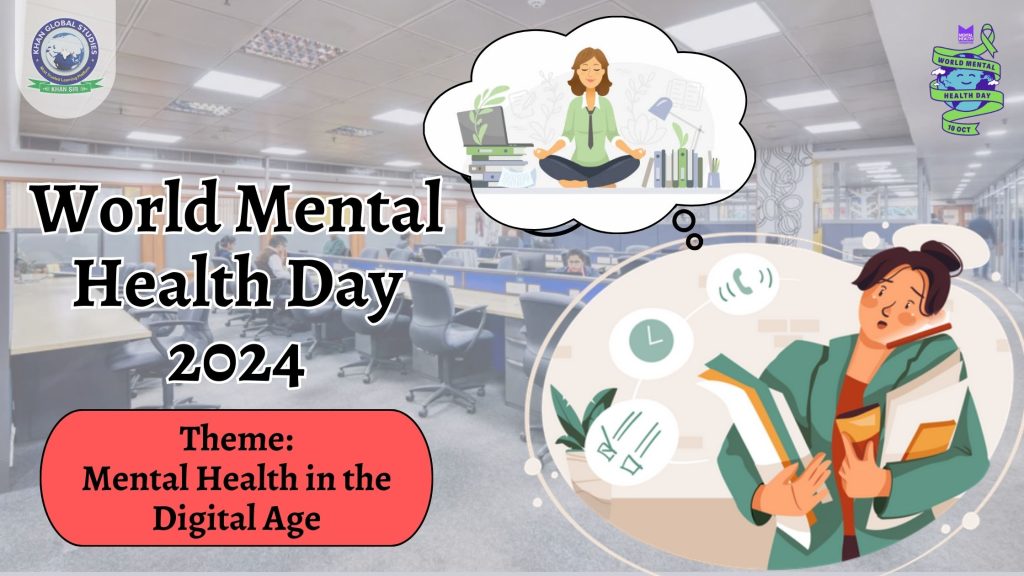Every year, World Mental Health Day is observed on October 10 to draw global attention to mental health issues, advocate for mental health rights, and empower individuals to seek help. In 2024, the theme is centered around promoting mental health awareness in an increasingly digital world, emphasising the importance of access, support, and innovation in mental health care. With the fallout of the pandemic, increasing technological advancements, and changes in social norms, mental health is more relevant than ever.
This article aims to highlight the significance of this day and provide comprehensive insights into mental health advocacy, support systems, and global initiatives aimed at creating a mentally healthy world.
History and Significance of World Mental Health Day
World Mental Health Day was first observed in 1992 by the World Federation for Mental Health (WFMH). It aimed to create awareness about mental health issues and promote education about mental health care. Since then, the day has evolved into a powerful platform that influences mental health policies and receives support from both governmental and non-governmental organisations globally.
In 2024, mental health will continue to be a serious concern, with millions of people around the world facing challenges such as depression, anxiety, stress and more serious mental illnesses. World Mental Health Day provides an opportunity for advocates, professionals and the general public to come together in solidarity, raise awareness, fight stigma and make mental health a global priority.
2024 Theme: Mental Health in the Digital Age
As technology continues to dominate every aspect of our lives, its impact on mental health has become a major concern. The theme of World Mental Health Day 2024, “Mental Health in the Digital Age”, focuses on the double-edged sword of digitalisation. While technology has enabled easy access to mental health resources, telehealth, and support communities, it has also introduced new challenges such as cyberbullying, social media addiction, and a rise in screen time-related mental health issues.
Benefits of Digitalization for Mental Health
- Increased Access to Mental Health Services: The rise of telemedicine and teletherapy has revolutionized mental health care. People living in remote areas or with mobility issues can now access mental health professionals via virtual platforms. This has also made mental health services more affordable and less time-consuming, helping those who previously avoided seeking help.
- Online Communities and Support Groups: Digital platforms have also fueled the growth of numerous mental health forums, online support groups, and mental health apps. These communities allow individuals to share their experiences, receive advice, and build supportive networks, reducing feelings of isolation.
- Innovations in Mental Health Technology: In recent years, AI-powered mental health tools such as chatbots and personal mental health tracking apps have emerged, providing users with the ability to monitor their mental health, engage in cognitive behavioural therapy (CBT) exercises, and receive on-demand advice. This shift towards proactive mental health management is an important step.
Challenges Posed by Digitalisation
- Cyberbullying and Online Harassment: With the expansion of social media and online platforms, incidents of cyberbullying have increased. Victims of online harassment often suffer from low self-esteem, anxiety, and depression, making mental health support crucial for those affected.
- Social Media and Mental Health: While social media can foster connection, it can also lead to comparison anxiety, fear of missing out (FOMO), and other mental health issues. The pressure to present an ideal life online can cause individuals to experience stress, anxiety, and even depression.
- Increased Screen Time: Excessive screen time has been linked to many mental health problems, including sleep disorders, attention problems, and social isolation. Balancing the benefits of digital engagement with its potential harms is a key challenge in maintaining mental health.
Global Mental Health Initiatives for 2024
In 2024, several global initiatives are being launched to promote mental health care and well-being. Governments and organizations are working together to address the growing mental health crisis. Below is a description of some of the key initiatives being implemented around the world:
United Nations Mental Health Strategy
The United Nations (UN) continues to advocate for mental health through its Sustainable Development Goals (SDGs). By incorporating mental health into the framework of global health and well-being, the UN aims to create a future where mental health care is universally accessible, free from stigma, and integrated into public health systems.
World Health Organization (WHO) Mental Health Action Plan
The World Health Organization (WHO) has developed a comprehensive mental health action plan for 2024, which focuses on:
- Strengthening mental health systems at the national and regional levels.
- Increasing investment in mental health services and the workforce.
- Increasing efforts to promote mental health and prevent mental disorders through community-based interventions.
- Encouraging mental health education in schools to develop resilience in children and adolescents.
Corporate Mental Health Programs
The private sector is also playing a key role in increasing mental health support for employees. Many corporations are now prioritizing mental health by offering mental health days, wellness programs, and access to mental health professionals. Companies are recognizing that mental health directly impacts productivity, creativity, and employee retention, making it an important aspect of workplace culture.
How to get involved in World Mental Health Day 2024?
- Raise Awareness on Social Media: Social media is a powerful tool for spreading awareness about mental health. This year, we encourage everyone to participate in digital campaigns such as using the hashtag #WorldMentalHealthDay2024 and sharing informative posts about mental health. These actions can help break down stigma and encourage conversations about mental health.
- Attend or Host Events: On World Mental Health Day 2024, many local and global events will take place. These include webinars, workshops, and community gatherings. We encourage individuals to attend these events or hold their events to raise awareness in their communities.
- Support Mental Health Charities: Another way to make a positive impact is to support mental health charities and organizations. Charities can provide much-needed resources for research, mental health services, and outreach programs. Volunteering your time and expertise is another valuable contribution.
Conclusion
Mental health is a universal human right that must be prioritized. As we move into an increasingly digital world, it is important to stay informed, seek help when you need it, and advocate for better mental health policies and services globally. World Mental Health Day 2024 reminds us of the importance of mental health, the challenges that still exist, and the steps we can take to create a mentally healthier society.




